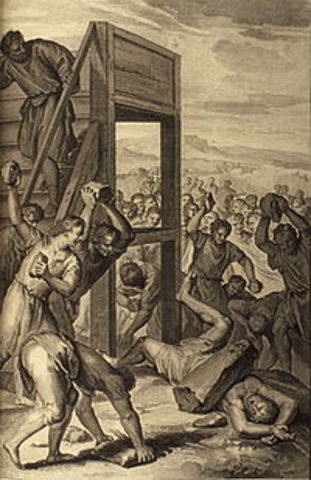This week’s Taste of Torah is written by staff writer Daniel Levine.
It would be very easy to write a nice Devar Torah about all of the nice things this week’s Torah portion teaches. The job of the Kohanim, the idea of Kidush Hashem, or a discussion of the holidays would all make for a nice and short Devar Torah. However, just as we think this week’s Parsha is about to end, we are presented with the story of the Blasphemer who is killed for his actions.
The story of the Blasphemer begins when the son of an interracial union, between an Egyptian man and Israelite woman, falls into a heated argument. As in many cases, the Torah is quite elusive in this passage, leaving much room for exegetical interpretation. Whatever happened, it obviously upset this young man a great deal, because in the next verse he curses using the divine name, YHWH. Now interestingly enough, the ancient Israelites, including Moses, did not know what to do with this man so they locked him in a makeshift jail while they went to God for guidance. God then answers that this man deserves to be stoned, and establishes a law for the future that any Jew or anyone living in the land of Israel should be killed for any similar action.
Now many of us may know that Chazal, on many different occasions, spoke out against death penalties, in general, while simultaneously updating many archaic laws in the Torah to fit with what was considered to be progressive in society at their time. However, as people who try and glean lessons from the weekly Torah portion we are still stuck with interpreting this story at face value.
In my eyes, we have a troubled young man who is presumably being ridiculed for his parents not both being “Jewish;” Why else would the Torah go out of its way to tell us that this man was the son of a mixed marriage? The child who is continuously being ridiculed decides to take out his anger at God. In a moment of frustration this young man curses God and is later killed for it.
Let me just say at the outset that there is absolutely no moral justification for this story. In my eyes, this is no different than when Islamic terrorist groups think that they have a God-given right to kill people for disrespecting Muhammad. Some commentators, such as Rashi, try to give point-by-point rationales for why this young man was actually a horrible person from a horrible family, in a dire effort to validate the actions in this story. However, I it think that these explanations actually make the story worse. I think that our only hope here is to change our view of what the Torah is supposed to be.
In many Jewish circles, the Torah is viewed as a God-given, objective truth, where everything written inside of it is perfect. If we wish to retain this view, then we are stuck between abandoning all moral reasoning or completely rejecting the Torah. However, it is my view that the goal of the Torah is to be a conversation jump starter. As Jews we have an obligation to think about many issues on a deep and critical level. When most people are presented with a difficult and controversial question such as the death penalty or abortion they are forced to think about the issue in an abstract way. As Jewish scholars we have the privilege of having 3,000 years of writing on almost any issue that can arise. There is almost always conflicting opinions within Judaism on any issue, and as students of the Torah it is our job to always try and understand both sides of a given issue in our quest for finding out what is correct.
The story of the Blasphemer can teach us many things. We can learn that sometimes the Torah’s answer is not the best way to deal with a controversial issue, and like Chazal, update the laws in the Torah. Or we can learn the dangers of ridiculing a peer because we have no idea how he will react. Furthermore, it is interesting to note that throughout the Torah there are many times when God immediately punishes someone for their actions through divine intervention (Miriam getting tzarat, Korach getting swallowed, etc.). In this story of the Blasphemer, God is silent until He is approached by the Jewish people. This leads me to think that if the Jews would have been silent and let this one go, God would not have felt it necessary to intervene. Once the Jews go and ask God what the punishment is, God then says that the punishment is death. In all, we can learn from this story that we should not be so quick to judge and punish people for their actions that we cannot understand.
—
This article is part of Ha’Am’s Friday Taste of Torah column. Each week, a different UCLA community member will contribute some words of Jewish wisdom in preparation for Shabbat.


cool